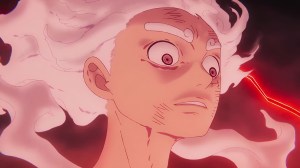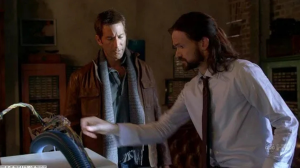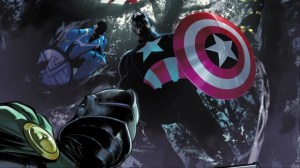In the decade since their inception, CHVRCHES has become a dominating force in the world of synth-pop, as they channel sounds that commanded the airwaves in the ’80s while injecting plenty of contemporary themes and perspectives into music that sounds incredibly fresh and nostalgic all at once. Amplifying that embrace of a bygone musical era are their stage shows, which are often soaked in neon lights and flashing strobes. The final product manages to both feel right at home sharing a stage at any number of indie-music festivals as well as popping up on a radio station where it’s wedged between classics from Depeche Mode or The Cure.
Videos by ComicBook.com
Not only did synths dominate pop music decades ago, but they also became a staple of the horror genre. Whether it be John Carpenter serving as the composer on classics he directed like Halloween and The Fog or it being Dario Argento embracing disco beats by enlisting Goblin for many of his giallos, the genre’s embrace of techno sounds has earned it an almost parody-level reputation for the era. For most, synths have served as a shorthand for establishing a love of the slashers from that period. Interestingly, horror films like Maniac, It Follows, and Beyond the Black Rainbow debuted shortly after the formation of CHVRCHES and all featured synth soundtracks, serving both as a tribute to their predecessors and as a revival of the versatile instruments.
With their love of synths and horror films, Lauren Mayberry, Iain Cook, and Martin Doherty fully leaned into those genre influences for their upcoming album Screen Violence, which is made obvious merely by looking at the tracklist, thanks to songs like “Final Girl” and “Nightmares.” Additionally, a number of the album’s promotional videos have leaned into the horror aesthetic wholly, offering a darker tonal shift from previous, more lighthearted releases. In fact, CHVRCHES even reached out to Carpenter himself for a collaboration opportunity, resulting in the upcoming seven-inch in which they have remixed his song “Turn the Bones” and Carpenter has remixed their “Good Girls.”
ComicBook.com caught up with the band to talk about their love of horror, its influence on their new album, and projects they’d like to potentially contribute music to.
CHVRCHES’ latest album, Screen Violence, is available now for pre-order through their official website before hitting shelves on August 27th.
Header photo courtesy of Sebastian Mlynarski & Kevin J Thomson
Cryptic Carpenter Clue
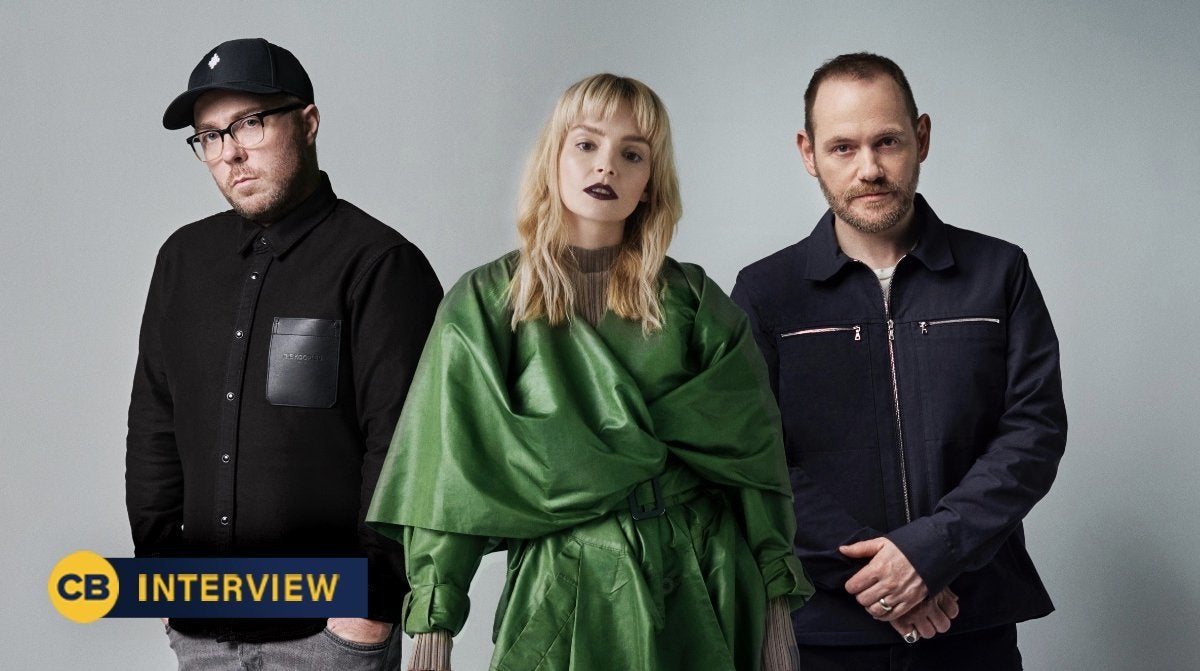
ComicBook.com: I do want to answer a controversy and I’m looking at you, Lauren. I don’t know if you can tell, because this is Zoom. This is a controversy, we’re going to set the record straight. You said on TikTok that you love The Fog for a reason that other people don’t love The Fog. And I really need you to weigh in on what you were talking about.
Lauren Mayberry: Oh, well, I was trying to leave a cryptic clue being like, “I love The Fog for all the reasons everybody else does, and the extra reason that John Carpenter had just remixed one of our songs.” So that was what I was trying to get at, I don’t know if that landed, though. But that means you made it all the way through that video, so thank you. I don’t know, I never know who’s going to watch. I’m too old to be using TikTok, I don’t know how to use it. The label was like, “You should do TikTok,” so I tried to do a TikTok and I’m like, “I don’t know.”
Martin Doherty: It’s funny, there’s actually many very, very old people on TikTok, and in the spectrum of TikTok you’re definitely on the younger end.
Mayberry: I benefit from that. Okay, well I’m bad at it, so there’s just no excuse for that. But sometimes I get to talk about films on it, which is nice.
Well, and for what it’s worth, I looked at TikTok on a web browser and it kept giving me errors, as opposed to … I don’t have it on my phone so it was quite the experience. But thank you for answering that and setting the record straight, we can put that controversy behind us.
First Horror Experiences
One interesting thing is, when I was doing research, I was able to find out the first time that I heard of CHVRCHES, and it was because an indie horror producer tweeted about you, your band, in July of 2013, and it was the video for “Now Is Not The Time,” so I was able to know precisely the first time I heard your band. I was hoping you could all talk about, when it comes to horror, what your first experience was, either a movie you saw that just absolutely horrified you or something that you absolutely loved.
Iain Cook: Well, the thing that made me both absolutely petrified with fear and completely addicted to horror for the rest of my life was, I think it was 1980 and it was a small town called Bathgate, near where I grew up, and they had the cinema called The Regal. At the time, there were no restrictions on what kind of trailers they could show, and my mum and dad had taken us to see 101 Dalmatians, and before the film started there was the f-cking trailer for The Shining.
You know the one, with the elevator doors and the music. And I just f-cking got under the seat, covered my ears, I couldn’t f-cking hack it. But it made me really obsessed with that film because, around that time, I kept seeing posters and seeing TV adverts for it and newspaper adverts. And every image I saw horrified me more, whether it was Danny running away from Jack, the maze at the end, or just the poster itself with the weird composite of [Jack Nicholson’s] face and Shelley Duvall with a knife. And I just became utterly obsessed and terrified by that film and, since then, it’s grown and grown.
Doherty: There’s a clear and obvious traumatic moment for me, which is, and it remains traumatic to me even today, every time we watch it. I think I saw Nightmare on Elm Street when I was like eight or nine years old. In one of those scenarios where, “Oh, so-and-so’s older brother has this movie Nightmare on Elm Street and we’re going to put it on and everyone’s going to have such a fun time.” And I slept with the lights on for like, it felt like years, but there was something about that hook. I’ve since gone on to become, obviously, obsessed with the entire series, a huge Wes Craven fan. And, although they got ridiculous and everything after the first movie isn’t anything to do with Wes Craven really … except he did write a screenplay for the third.
Cook: New Nightmare he directed.
Doherty: And he directed New Nightmare, but that’s … okay, agreed, but it depends on what you consider actual canon. But I became completely obsessed with that hook, that when you were asleep would be the moment that you were at your most vulnerable, and nobody can protect you. Not your mom and dad, there’s nothing you can do but submit to the fear, that a burnt pedo was going to get you. It was truly f-cking horrifying. And still, even now, we can laugh and we can watch [A Nightmare on Elm Street 5: The] Dream Child and the best one, which is, in my opinion, the third one, Dream Warriors. And it can be funny, the style, this darkness that runs through the whole thing, for me, this horrible fascination, because of how traumatic it was.
Well, I think that was the tagline for the first one, originally, was “the burnt pedo is going to get you.”
Cook: That’s way better than “never sleep again” or whatever it was. As a sidebar to the Nightmare on Elm Street conversation, I’m really surprised that [Queen’s] Brian May agreed to do the score for a film called “Freddy’s Dead.”
Doherty: Wow, Brian May did that score?
Cook: He did.
Mayberry: I never thought…
Cook: And it was like, Freddie [Mercury] had died. F-cking weird.
Mayberry: Is it a different spelling?
Cook: A different Brian May?
Mayberry: No, a different spelling?
F-R-E-D-D-Y.
Doherty: It’s actually, the film’s tagline is “Freddy’s Dead: The Final Nightmare” that actually makes it even worse.
Mayberry: That’s sad.
Doherty: I saw that in the cinema with the 3D glasses, it was f-cking terrible.
Mayberry: I feel like, for me, it started with books and TV shows. So it would be like Goosebumps books were so scary. Too scary, and then thinking I could watch the TV version, and that’s too scary, and thinking that I can move on to Point Horror, and that’s too scary, and then thinking it’s safe to watch Buffy [the Vampire Slayer], and that’s too scary. But then, again, I remember being at a sleepover at someone’s house and I was watching I Know What You Did Last Summer based off of, “It’s got Jennifer Love Hewitt, Sarah Michelle Geller and Buffy’s in it, it can’t be that scary.”
And hunks.
Mayberry: Yeah, we were like, “Oh, my God, Freddy Prinze is in it, so we have to watch it.” We weren’t American, I don’t know why I was talking like that. But yes, that didn’t go well. And I re-watched that during the making of CHVRCHES’ record last year and then I was like, “Hah!” I love the story and the way that it’s told, and that it’s quite campy. There’s quite a lot of bad acting in it, though, which I didn’t pick up on at the time. Sarah Michelle, flawless. She is leagues above everything else. But I was like, oh man, I was really invested in the creative arc of that film, which, I don’t know.
Doherty: It’s almost like, in that era of teen cinema, they prioritize good-looking people over good actors.
Cook: They still do.
Mayberry: Who knew? Sarah Michelle, I stand by, she is really good.
Doherty: You’ve got to have one … Sarah Michelle Gellar is really good. You’ve got to have one or two that can carry most of the dialogue from the movie, so it doesn’t get f-cking ridiculous. But the rest of them, it doesn’t really matter, as long as they look the part.
Mayberry: Bless their hearts. Freddie Prinze Jr. and Jennifer Love Hewitt, it’s a rough one for them. In that, I know that they’re traumatized by, obviously, a hook-hand fisherman, it’s very stressful, but there’s a lot of … They’re smelling things that are far away and you’re like, “Oh, no, they’re scared.”
And, hey, Freddie and Sarah are still married, so love prevails. It’s a happy ending, even if there’s hook-hands running around.
Doherty: Oh, I thought you were talking about Freddy Krueger. Like, what the f-ck.
Cook: There’s three Freddys in this conversation.
Remix Reality
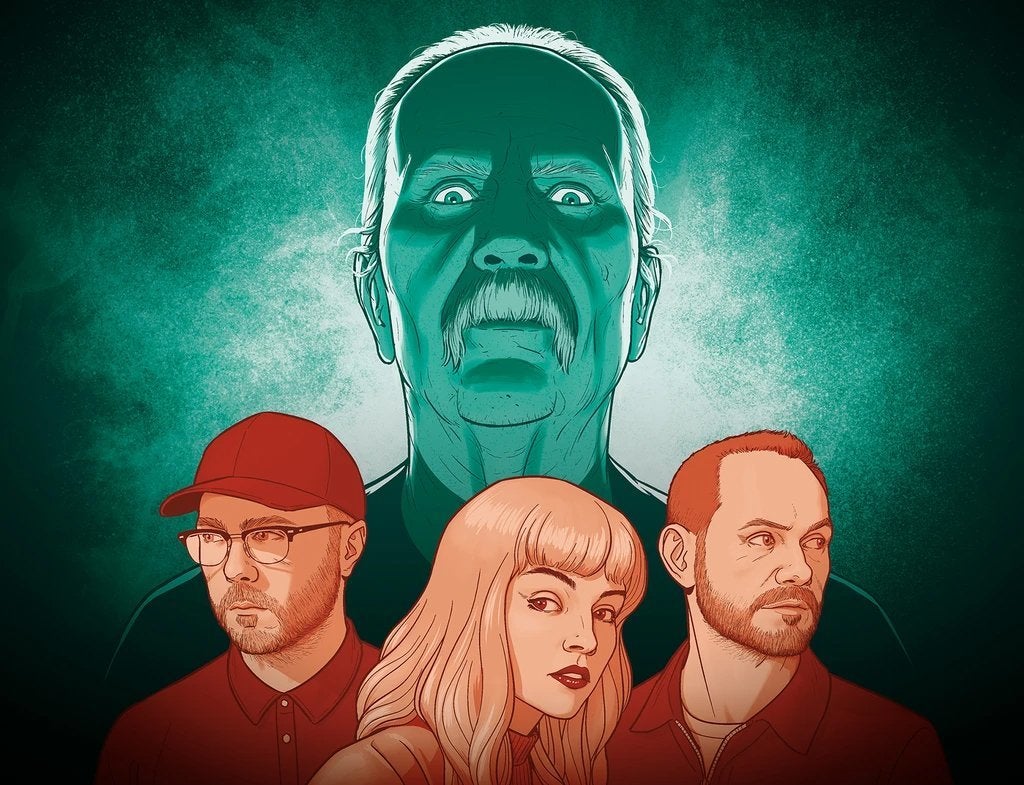
When it came to the collaboration with John Carpenter, I know it was just a pipe dream, wishful thinking. Do you remember who was the first one of you to have the idea of, “No, let’s actually reach out to him,”?
Mayberry: Well, we were all in our houses, as everybody was last year, and I love to plan stuff, the guys can vouch for that. I love a little plan, I love a little homework, I love a spreadsheet.
Cook: You love a bit of planning.
Mayberry: Just, also, because we were [thinking], “What if we can’t tour this record? How will we make it fun? What fun stuff can we do that we wouldn’t normally be able to, because everything’s so different?” We were talking about the album rollout and I said, “Maybe it would be cool,” because we’d been watching all these movies for research, “Wouldn’t it be cool to do alternative remixes rather than the club remixes we get?” The email was literally, “I don’t know, someone like John Carpenter, but obviously not him.” A little list of people that we’ve Googled, stuff like that, and then they could interpret it in their way. And then our manager [said], “Well, I may as well shoot for the stars, let’s see.” And he wanted to do it, which is baffling and mad.
What was the collaboration process like once it actually happened? Was it very much just, he did his own thing and came back however many weeks later? Or was there a conversation the whole time?
Doherty: No, no, no. No conversation, really, he was allowed to … I’m sorry, I mean he chose to work on the song, asked for the stems and, like you would do when you’re working with someone that’s so inspirational and has had the career that he’s had. You say, “Well, I’ll hear from you in a few weeks or a month, or if it doesn’t work out, don’t worry about it. Just do your thing.” We hope, everybody just hopes that they meet in the same place creatively when it’s done. And, the truth is, at the end of the process, when they sent it through, my first reaction was, “Ah no, it’s better than the original,” which is, I guess, the highest accolade for a remix. But, as a writer, as a producer, rather, that’s the last thing you want to say. A good remix should be like a good support band, pretty good, but not like they show up the main act.
Unfortunately, in this instance, when you go to f-cking one of the most iconic composers and filmmakers of all time, you’re really asking for it. He did show us up a little bit. What was pretty cool, I thought, was instead of saying, “Oh, well do you want to pay me for the remix?” he consigned us and invited us to remix one of his. And then this idea of a split seven-inch, or I don’t know if it ended up a 10-inch, maybe it did.
Cook: Seven, I think.
Doherty: Split vinyl on Sacred Bones [Records] came up, and we were like, “Isn’t this just the coolest thing that we could ever have imagined?” The process was … it wasn’t a thing where we’re talking every other day, but still really rewarding.
Do you think it was more nerve-wracking waiting to get the track that he remixed back from him or was it more nerve-wracking sending him your version of his track to see how he was going to feel about it?
Cook: Oh, the latter, effortlessly the latter, because the ball’s in his court with his remix and we knew that, no matter what he came up with, it would be f-cking cool because he’s an incredible creative, incredible musician. When it came to doing the remix of “Turning the Bones,” it was a different story, where we started throwing ideas around and, because it’s in a weird time signature, it’s in like six-four or something, so we ended up just making it four-four so it was easier for us to do our thing. Just taking elements of the lead and the textures in it and carving our own thing around it. But I guess the prevailing thought that we discussed before we started working on it, was that we wanted it to be, because you can’t really out-synth the synth master, right?
Doherty: Well, you tried.
Cook: Well, that’s the thing…
Doherty: The first version was, Iain did send a version across to me with a bunch of synth in it, I was like, “Mate, no.”
Cook: No, the synths were mostly chopped up things from his stems, and then we put our stuff on top of it.
Doherty: Oh, well they were still very synthy.
Cook: But they were his stems, they weren’t mine. Then, when Martin and Lauren heard it, they were right. “Let’s take it more down the acoustic route, like we discussed,” and so we started putting piano and bass and stuff like that in. It was a really fun thing to do, but, always, before you send these things off, there’s that moment of, “Oh, my God, what if he f-cking hates it?” But I guess he didn’t.
“Never Sleep Again”

This wasn’t just the one-time collaboration with John Carpenter, “The Horror Master,” as his Twitter handle will tell you. The concept of Screen Violence, you have all these tracks, “Final Girl,” “Violent Delights,” “Nightmares,” there’s so many that are clearly influenced by horror. Was that an active choice of starting to get this vibe and wanting to lean fully into it, to make a more horror-themed album, or was it just you were writing songs and that was naturally and organically the direction that things were going?
Mayberry: Well, we actually started with the album title. So we knew that we wanted it to be something in that universe, but we didn’t know whether it was just going to be, “This is the title and there’s a couple of references and the aesthetic is that,” or if it was actually going to be more heavily in that space. I think, maybe once we were about three or four songs in, that’s when it really felt like, “Okay, we’re on this specific track and the songs aren’t concepts about horror movies necessarily,” but I liked the idea that you can take these personal stories and set them in that landscape, if that makes sense. So there is a lot of imagery weaving in and out of the songs.
And, man, three different songs, I tried to get the phrase “never sleep again” into, it was, shoot, trying to get it in each song. The chorus of the song “Good Girls” used to have “never sleep,” it would be like “never sleep again, dah dah, dah dah dah.” And then we couldn’t, I was like, “No, it doesn’t make sense, so it has to be something else.” When I finally got that one in [“Violent Delights”], I was like, “Yes! We got the right reference in the right place.” But I think it was really fun because we wanted it to be, I don’t know, fun and escapist and campy, in some ways, because that’s what that era is, and you have to be embracing that if you’re going to truly inhabit the space. But then have the stories being more modernized and, especially with the female voice and female lyrics in it, I think that it is a different slant on the stories, I suppose.
It’s interesting that you mentioned you wanted to have that “never sleep again,” and that you mentioned “Good Girls,” because, as I was listening to it and looking at the track titles, I couldn’t help but notice that having “Good Girls,” “Lullabies,” and “Nightmares” in a row, which felt in the realm of Nightmare on Elm Street. And then, right before that, these three songs like Friday the 13th because you have “Violent Delights,” you have “Final Girl,” and then you also have “How Not to Drown,” which would be good advice for Jason Voorhees, I think.
Mayberry: It didn’t go that well for him.
Cook: We didn’t mean that, I don’t think.
Doherty: That was unintentional, but don’t let the truth get in the way of a good story. And that’s how it’s going to be.
Mayberry: I know, that’s much better. We were arranging everything in trilogy form throughout the album.
I haven’t figured out the rest of the songs yet, but the album is not fully out. So give me, just you know, a week.
Cook: Let us know.
Creativity Overload
Because this album was made during the pandemic, during lockdown, did you personally feel, because of state of the world, creatively, did you feel completely bogged down by everything and it was tough to get creative? Or was it the other end, where, because you didn’t have your outlet of collaborating as you normally would, were you just overflowing with creativity that you had to get out there?
Doherty: Very much the latter, I think, but that is like just my natural state anyway. Somebody said to me, “Some people need to feel good to create and other people, they need to create to feel good,” and I’m definitely the “create to feel good” type of person. So when the coronavirus hit, as in, the way that it did, that just made me insanely creative and just wanted to be in the studio because I wanted to block as much of it out as I could, which is grim, but it is the truth. And that sent me off on this whole new path of investigating the creative process in a deeper way than I ever have before. All the way down into building new pieces of equipment and learning how, understanding like schematics of how a compressor works, and then trying to build one. Or like a bit smaller, starting small with circuits like guitar pedals and trying to build those.
And then, the natural progression is like, once you build the guitar pedal, you go, “Oh, now that I have this, I’m going to plug it in and play with it for a while.” Then one thing leads to another and you’ve written a song, and I went through that over and over and over again. I was writing every single day, which is cool because it’s hard to collaborate on Zoom from the ground up. Like, if the four of us right now were to try and write a song, I don’t think it would work, because you need to capture some sort of energy of everyone in the room, certainly in my opinion. But the process of producing songs out, once they’re already, like, the initial idea’s there, that totally can be achieved across Zoom. We did loads of that in the pandemic. So it was a mixed bag, creatively. Because the world was falling apart and everyone has ebbs and flows, but it definitely made me more creative.
Speaking to that collaboration on Zoom, did this whole experience of creating Screen Violence from quarantine across the world, did it serve as an eye-opener of, “Wow, look how much can be accomplished virtually,” and what potential there is for the future? Or was it, “I never want to do this again. I need to be with these folks to make this album,”?
Cook: A mixture of both, but mostly I was really, really pleasantly surprised by what we did manage to achieve remotely. Certainly we had no idea, we’d never really done it before. But once we got the technology sorted out, we were able to use both studios concurrently and still collaborate and share files really quickly. So that was amazing and worked really well. But I don’t think that, looking to the future, it will ever be a substitute for being in the room with other humans. I just can’t see that. So, happy to be together with these people again.
Full-Length Score

I love your cover of “Bela Lugosi’s Dead,” which you did for The Vampire Academy soundtrack.
Cook: That was a while ago.
Doherty: You were the only one.
Given your love of horror and synth, have you ever talked about wanting to do a score for a movie, whether it’s horror or otherwise?
Cook: I mean, that would be great fun.
Doherty: “Yes,” is the short answer, if any directors are watching.
Mayberry: It’s a “yes.” Every time I hear X film is being made or if X sequel is coming out. I always email, “Can we ask?” And then nobody ever says yes. So every time I hear about one, or I see the thing on Deadline and I’ll email the manager. I mean, I don’t know if this is how it works, but, “Can we ask them if they want something, we can make it for them?” It hasn’t worked so far, but yes.
Cook: It was sad when Stranger Things came out, I was just like, “F-ck, we should have done that.”
Mayberry: I know, I was like, “In a way, that’s rude.” I was like, “You’ve really come so close to our grass with your mower, but you have not allowed us to cut this grass,” but one day.
Doherty: I know, we would have dominated that.
Mayberry: “You’re mowing right next to our grass, but we didn’t do anything.”
Doherty: Those guys came in and were like, “Can we borrow your lawnmower? We’ll bring it back in the next hour. I’m just going to mow this f-cking amazing house right next to yours. Thanks very much.”
Dream Franchise
That was one of my follow-up questions, if there was a dream franchise or reboot or sequel … Do the three of you have a franchise that you will stop at nothing to contribute music to?
Cook: Wow. That’s a big question.
Doherty: I think there’s probably a list of like 20 IPs that I would go like that for. That’s not because I’m just a shill and I’ll do anything, it’s because I’m actually a mad fan-lord. I should preface that.
Cook: This is true. The guy who’s just bought a Terminator hand.
You just bought a Terminator hand?
Doherty: I’ve just spent a lot of money on a Sideshow Collectibles exact replica of the Terminator hand that’s in T2, when they break into Cyberdyne Systems. And it’s in the glass case with the chip next to it. It’s f-cking cool.
Cook: It’s f-cking cool.
Mayberry: I was very excited when the 2018, I guess it’s not really a reboot, well, sort of extended sequel thing for Halloween came in. But, obviously, there’s somebody across that music already that doesn’t need our help.
We have done some, we can’t tell you what it is, but we have done something exciting that exists within this universe, but we will get murdered if we tell you what it is yet. But at some point in the not-super-distant future, that will become clear. Sorry, that’s very cryptic.
Cook: Very cryptic, yeah.
Mayberry: But there is something cool coming.
Doherty: I think there’s probably more of a chance that we will score a video game before we score a movie. Movie people, they like us, but they don’t like us enough to …There’s a lot of really good, professional movie composers out there, and they don’t want bands coming in and f-cking stealing their thunder. But in the video game realm, they seem to be more open to the technology aspect and we’re massive fans of that, too. Anyway, you never know.
“Please, John, Get On It.”
Since John Carpenter has not directed a movie in 10 years, when I asked him why he hasn’t done one, his reaction was, “That’s work. I don’t want to work.” But he did a music video for “Christine,” the re-recording that he released of “Christine,” so if there was a song on Screen Violence that Carpenter would free up some time to direct a music video for, which song on the album do you think his aesthetic you’d really love to see him interpret?
Cook: I don’t know if it would ever be a single, but if he was to direct a video for “Nightmares,” I would be a very happy man.
Mayberry: I’m going to say “Final Girl,” because he is the creator of one of the most iconic Final Girls of all time. And one of the [songs] that I think works through a female and feminist gaze. A lot of those things don’t and I feel like he handles female characters really well. So that one. Please, John, get on it.
Doherty: Well, you just chose the best two, so I’m stuck with what is available now.
Mayberry: “Violent Delights” would be cool.
Doherty: That’s what I was going to say.
Mayberry: Sorry I dropped that.
Cook: We stole our best three.
Mayberry: Sorry.
Doherty: But yeah, “Violent Delights.” At least we’re aligned on what we think would be cool.
Cook: So put in a good word when you speak to him, please.
*****
CHVRCHES’ latest album, Screen Violence, is available now for pre-order through their official website before hitting shelves on August 27th.
This interview has been edited for length and clarity. You can contact Patrick Cavanaugh directly on Twitter.



